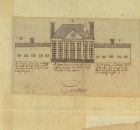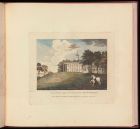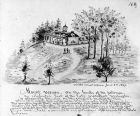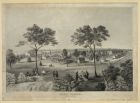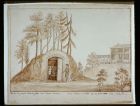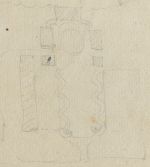Difference between revisions of "Mount Vernon"
C-tompkins (talk | contribs) (→Texts) |
C-tompkins (talk | contribs) (→Texts) |
||
| Line 74: | Line 74: | ||
==Texts== | ==Texts== | ||
| + | *[[George Washington|Washington, George]], 25 December 1782, describing [[Mount Vernon]], Fairfax County, Va. (quoted in Johnson 1953: 87–88) <ref name="Johnson_1953">Johnson, Gerald W. ''Mount Vernon: The Story of a Shrine''. New York: Random House, 1953. [https://www.zotero.org/groups/54737/items/itemKey/F2JS5DHZ view on Zotero]</ref> | ||
| + | :"I wish that the afore-mentioned [[shrubs]] and ornamental and curious trees may be planted at both ends that I may determine hereafter from circumstances and appearances which shall be the [[grove]] and which the [[wilderness]]. It is easy to extirpate Trees from any spot but time only can bring them to maturity." | ||
| + | |||
| + | |||
| + | *[[George Washington|Washington, George]], 1785, describing [[Mount Vernon]], Fairfax County, Va. (Jackson and Twohig, eds., 1978: 4:96, 97) <ref name="Jackson-Twohig_1978">Jackson, Donald, and Dorothy Twohig, eds. 1978. ''The Diaries of George Washington''. 6 vols. Charlottesville, Va.: University Press of Virginia. [https://www.zotero.org/groups/54737/items/itemKey/TDKNKCXK/q/Twohig view on Zotero]</ref> | ||
| + | :"[28 February] Planted all the Mulberry trees, Maple trees, & Black gums in my Serpentine [[walk]]s and the Poplars on the right [[walk]]—the Sap of which and the Mulberry appeared to be moving. Also planted 4 trees from H. Hole the name unknown but of a brittle wood which has the smell of Mulberry. . . . | ||
| + | :"[2 March] . . . Planted the remainder of the Ash Trees—in the Serpentine [[walk]]s—the remainder of the fringe trees in the [[shrubbery|Shrubberies]]—all the black haws—all the large berried thorns with a small berried one in the middle of each clump—6 small berried thorns with a large one in the middle of each clump—all the swamp red berry bushes & one clump of locust trees." | ||
| + | |||
| + | |||
*[[J.P. Brissot de Warville|Brissot de Warville, J.P.]], 1788, describing [[Mount Vernon]], plantation of [[George Washington]], Fairfax County, Va. (1919: 254) <ref name="BrissotdeWarville_1919"> Brissot de Warville, J.-P. (Jacques-Pierre). 1919. ''New Travels in the United States Performed in 1788''. Bowling Green, Ohio: Historical Publications Co. [https://www.zotero.org/groups/54737/items/itemKey/GH5VFB9D view on Zotero]</ref> | *[[J.P. Brissot de Warville|Brissot de Warville, J.P.]], 1788, describing [[Mount Vernon]], plantation of [[George Washington]], Fairfax County, Va. (1919: 254) <ref name="BrissotdeWarville_1919"> Brissot de Warville, J.-P. (Jacques-Pierre). 1919. ''New Travels in the United States Performed in 1788''. Bowling Green, Ohio: Historical Publications Co. [https://www.zotero.org/groups/54737/items/itemKey/GH5VFB9D view on Zotero]</ref> | ||
:"I hastened to arrive at [[Mount Vernon]], the seat of General Washington, ten miles below Alexandria on the same river. On this rout you traverse a considerable [[wood]], and after having passed over two hills, you discover a country house of an elegant and majestic simplicity. It is preceded by grass [[plat]]s; on one side of the [[avenue]] are the stables, on the other a [[greenhouse|green-house]], and houses for a number of negroe mechanics. In a spacious back yard are turkies, geese, and other poultry. This house overlooks the Potowmack, enjoys an extensive [[prospect]], has a vast and elevated [[portico]] on the front next to the river, and a convenient distribution of the apartments within." | :"I hastened to arrive at [[Mount Vernon]], the seat of General Washington, ten miles below Alexandria on the same river. On this rout you traverse a considerable [[wood]], and after having passed over two hills, you discover a country house of an elegant and majestic simplicity. It is preceded by grass [[plat]]s; on one side of the [[avenue]] are the stables, on the other a [[greenhouse|green-house]], and houses for a number of negroe mechanics. In a spacious back yard are turkies, geese, and other poultry. This house overlooks the Potowmack, enjoys an extensive [[prospect]], has a vast and elevated [[portico]] on the front next to the river, and a convenient distribution of the apartments within." | ||
| Line 87: | Line 96: | ||
| + | [[File:1041.jpg|thumb|150px|Fig. 2, Benjamin Henry Latrobe, Sketch plan of serpentine walks at Mount Vernon, July 19, 1796.]] | ||
* [[Latrobe, Benjamin Henry]], 19 July 1796, describing [[Mount Vernon]], plantation of [[George Washington]], Fairfax County, Va. (1977: 1:163-165) <ref name="Latrobe_1977"> Latrobe, Benjamin Henry. 1977. ''The Virginia Journals of Benjamin Henry Latrobe, 1795–1798''. Edited by Edward C. Carter II. 2 vols. New Haven, Conn.: Yale University Press. [https://www.zotero.org/groups/54737/items/itemKey/SZEEBG9K/q/latrobe view on Zotero]</ref> | * [[Latrobe, Benjamin Henry]], 19 July 1796, describing [[Mount Vernon]], plantation of [[George Washington]], Fairfax County, Va. (1977: 1:163-165) <ref name="Latrobe_1977"> Latrobe, Benjamin Henry. 1977. ''The Virginia Journals of Benjamin Henry Latrobe, 1795–1798''. Edited by Edward C. Carter II. 2 vols. New Haven, Conn.: Yale University Press. [https://www.zotero.org/groups/54737/items/itemKey/SZEEBG9K/q/latrobe view on Zotero]</ref> | ||
:"The general plan of the building is as at Mr. Man Pages at Mansfield near Fredericsburg, of the old School. . . . The center is an old house to which a good dining room has been added at the North end, and a study &c. &c., at the South. The House is connected with the Kitchen offices by [[arcade]]. . . . Along the other front is a [[portico]] supported by 8 square pillars, of good proportions and effect...The ground on the West front of the house is laid out in a level lawn bounded on each side with a wide but extremely formal serpentine [[walk]], shaded by weeping Willows. . . . On one side of this lawn is a plain [[Kitchen garden]], on the other a neat [[flower garden]] laid out in squares, and boxed with great precission. Along the North Wall of this Garden is a plain [[Greenhouse]]. The Plants were arranged in front, and contained nothing very rare, nor were they numerous. For the first time again since I left Germany, I saw here a [[parterre]], chipped and trimmed with infinite care into the form of a richly flourished Fleur de Lis: The expiring groans I hope of our Grandfather's pedantry." [Fig. 2] | :"The general plan of the building is as at Mr. Man Pages at Mansfield near Fredericsburg, of the old School. . . . The center is an old house to which a good dining room has been added at the North end, and a study &c. &c., at the South. The House is connected with the Kitchen offices by [[arcade]]. . . . Along the other front is a [[portico]] supported by 8 square pillars, of good proportions and effect...The ground on the West front of the house is laid out in a level lawn bounded on each side with a wide but extremely formal serpentine [[walk]], shaded by weeping Willows. . . . On one side of this lawn is a plain [[Kitchen garden]], on the other a neat [[flower garden]] laid out in squares, and boxed with great precission. Along the North Wall of this Garden is a plain [[Greenhouse]]. The Plants were arranged in front, and contained nothing very rare, nor were they numerous. For the first time again since I left Germany, I saw here a [[parterre]], chipped and trimmed with infinite care into the form of a richly flourished Fleur de Lis: The expiring groans I hope of our Grandfather's pedantry." [Fig. 2] | ||
| − | |||
| − | + | ||
| − | |||
| − | |||
| Line 107: | Line 114: | ||
| − | + | ||
| − | |||
Revision as of 17:02, June 13, 2014
Mount Vernon, located in Fairfax County, Virginia near Alexandria, was the plantation home of the first President of the United States, George Washington.
Overview
Alternate Names: Little Hunting Creek Plantation
Site Dates: 1752 - 1848
Site Owner(s): George Washington
Site Designer(s): George Washington
Location:
Alexandria, VA
View on Google maps
Associated Sites:
Associated Terms: Ancient Style, Arcade, Avenue, Botanic garden, Bowling green, Clump, Deer park, Drive, Eminence, Flower garden, Fountain, French style, Greenhouse, Grove, Ha-Ha/Sunk fence, Hedge, Kitchen garden, Labyrinth, Lawn, Mound/Mount, Nursery, Orchard, Piazza/Veranda/Porch/Portico, Picturesque, Plantation, Plot/Plat, Pot, Quarter, Shrubbery, Square, Sundial, View/Vista, Wall, Wilderness, Wood/Woods
Images
Samuel Vaughan, Plan of the buildings and grounds of Mount Vernon, 1787.
Edward Savage, The West Front of Mount Vernon, c.1787-1792.
Edward Savage, The East Front of Mount Vernon, c.1787-1792.
George Isham Parkyns, View of Mount Vernon, 1795.
Benjamin Henry Latrobe, "View of Mount Vernon looking to the North," July 17, 1796.
Benjamin Henry Latrobe, "View to the North from the Lawn at Mount Vernon," 1796.
Benjamin Henry Latrobe, "View of Mount Vernon looking towards the South West," 1796.
George Washington, Plan of "Ha! Haws" at Mount Vernon, 1798.
Alexander Robertson (artist), Francis Jukes (engraver), Mount Vernon in Virginia, 1800.
George Ropes, Mount Vernon, 1806.
William Russell Birch, "Mount Vernon, Virginia, the Seat of the late Genl. G. Washington" in The Country Seats of the United States of North America (1808), n.p.
- 0335.jpg
Stephen Longfellow, "Mt. Vernon, Sketch Plan by Samuel Vaughan, Aug. 1787," c.1820.
Alexander Jackson Davis, "Mount Vernon," c.1831.
Lewis Miller, “Mount Vernon” [detail], in Orbis Pictus (c.1850), p.108.
William Matthew Prior, Washington's Tomb at Mount Vernon, c.1855.
Anne-Marguerite-Henriette Rouillé de Marigny Hyde de Neuville, attr., Tomb du grande Washington au Mount Vernon [detail], n.d.
Texts
- Washington, George, 25 December 1782, describing Mount Vernon, Fairfax County, Va. (quoted in Johnson 1953: 87–88) [1]
- "I wish that the afore-mentioned shrubs and ornamental and curious trees may be planted at both ends that I may determine hereafter from circumstances and appearances which shall be the grove and which the wilderness. It is easy to extirpate Trees from any spot but time only can bring them to maturity."
- Washington, George, 1785, describing Mount Vernon, Fairfax County, Va. (Jackson and Twohig, eds., 1978: 4:96, 97) [2]
- "[28 February] Planted all the Mulberry trees, Maple trees, & Black gums in my Serpentine walks and the Poplars on the right walk—the Sap of which and the Mulberry appeared to be moving. Also planted 4 trees from H. Hole the name unknown but of a brittle wood which has the smell of Mulberry. . . .
- "[2 March] . . . Planted the remainder of the Ash Trees—in the Serpentine walks—the remainder of the fringe trees in the Shrubberies—all the black haws—all the large berried thorns with a small berried one in the middle of each clump—6 small berried thorns with a large one in the middle of each clump—all the swamp red berry bushes & one clump of locust trees."
- Brissot de Warville, J.P., 1788, describing Mount Vernon, plantation of George Washington, Fairfax County, Va. (1919: 254) [3]
- "I hastened to arrive at Mount Vernon, the seat of General Washington, ten miles below Alexandria on the same river. On this rout you traverse a considerable wood, and after having passed over two hills, you discover a country house of an elegant and majestic simplicity. It is preceded by grass plats; on one side of the avenue are the stables, on the other a green-house, and houses for a number of negroe mechanics. In a spacious back yard are turkies, geese, and other poultry. This house overlooks the Potowmack, enjoys an extensive prospect, has a vast and elevated portico on the front next to the river, and a convenient distribution of the apartments within."
- Enys, Lt. John, 12 February 1788, describing Mount Vernon, plantation of George Washington, Fairfax County, Va. (Cometti, ed., 1976: 246) [4]
- "From hence is one of the most delightfull Prospects I ever beheld. It had the Command of a View each way of some Miles up and down the River Potowmack whch [sic] is here about two Miles broad On which during the Summer there are constantly ships moving. The Hills arrownd it are coverd with plantations some of which have Elegant houses standing on them all of which being situated on Eminences form very beautifull Objects for each other."
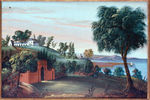
- Gerry, Elbridge, Jr., July 1813, describing Mount Vernon, plantation of George Washington, Fairfax County, Va. (1927: 174) [5]
- "Back of the mansion is a summer house, which commands an elegant view of the Potomac." [Fig. 1]
- Latrobe, Benjamin Henry, 19 July 1796, describing Mount Vernon, plantation of George Washington, Fairfax County, Va. (1977: 1:163-165) [6]
- "The general plan of the building is as at Mr. Man Pages at Mansfield near Fredericsburg, of the old School. . . . The center is an old house to which a good dining room has been added at the North end, and a study &c. &c., at the South. The House is connected with the Kitchen offices by arcade. . . . Along the other front is a portico supported by 8 square pillars, of good proportions and effect...The ground on the West front of the house is laid out in a level lawn bounded on each side with a wide but extremely formal serpentine walk, shaded by weeping Willows. . . . On one side of this lawn is a plain Kitchen garden, on the other a neat flower garden laid out in squares, and boxed with great precission. Along the North Wall of this Garden is a plain Greenhouse. The Plants were arranged in front, and contained nothing very rare, nor were they numerous. For the first time again since I left Germany, I saw here a parterre, chipped and trimmed with infinite care into the form of a richly flourished Fleur de Lis: The expiring groans I hope of our Grandfather's pedantry." [Fig. 2]
- Washington, George, 1785, describing Mount Vernon, plantation of George Washington, Fairfax County, Va. (Jackson and Twohig, eds., 1978: 4:86: Johnson 1953: 100[2][1])
- "[8 February] Finding that I should be very late in preparing my Walks & Shrubberies if I waited till the ground should be uncovered by the dissolution of the Snow—I had it removed Where necessary & began to Wheel dirt into the Ha! Haws &ca.—tho' it was it exceeding miry & bad working. . . . [Fig. 6]
- "[11 March] Planted . . . 13 Yellow Willow trees alternately along the Post and Rail fence from the Kitchen to the South ha-haw and from the Servants' Hall to the Smith's Shop."
- Washington, George, 1786, describing Mount Vernon, plantation of George Washington, Fairfax County, Va. (Jackson and Twohig, eds., 1978: 4:267, 293)[2]
- "[25 January] And set about the Banks round the Lawn, in front of the gate between the two Mounds of Earth. . . . [Fig. 4]
- "[13 March] The ground being in order for it, I set the people to raising and forming the mounds of Earth by the gate in order to plant weeping willow thereon."
- Washington, George, 1785 and 1786, describing Mount Vernon, plantation of George Washington, Fairfax County, Va. (Jackson and Twohig, eds., 1978: 4:99, 107, 304)[2]
- "[7 March 1785] Planted all my Cedars, all my Papaw, and two Honey locust Trees in my Shrubberies and two of the latter in my groves—one at each (side) of the House and a large Holly tree on the Point going to the Sein landing. . . .
- "Finished Plowing the Ground adjoining the Pine Grove, designed for Clover & Orchard grass Seed. . . .
- "[24 March 1785] Finding the Trees round the Walks in my wildernesses rather too thin I doubled them by putting (other Pine) trees between each.
- "Laid off the Walks in my Groves, at each end of the House. . . .
- "[6 April 1786] Transplanted 46 of the large Magnolio of So. Carolina from the box brought by G. A. Washington last year—viz.—6 at the head of each of the Serpentine Walks next the Circle—26 in the Shrubbery or grove at the South end of the House & 8 in that at the No. end. The ground was so wet, more could not at this time be planted there."
- Washington, George, 1785, describing Mount Vernon, plantation of George Washington, Fairfax County, Va. (Jackson and Twohig, eds., 1978: 4:94, 97, 99)[2]
- "[22 February] I also removed from the Woods and old fields, several young Trees of Sassafras, Dogwood, & red bud, to the Shrubbery on the No. Side the grass plat. . . .
- "Planted the remainder of the Ash Trees—in the Serpentine walks—the remainder of the fringe trees in the Shrubberies—all the black haws—all the large berried thorns with a small berried one in the middle of each clump—6 small berried thorns with a large one in the middle of each clump—all the swamp red berry bushes & one clump of locust trees. . . .
- "[3 March] Planted the remainder of the Locusts—Sassafras—small berried thorn & yellow Willow in the Shrubberies, as also the red buds— a honey locust and service tree by the South Garden House. Likewise took up the clump of Lilacs that stood at the Corner of the South Grass plat & transplanted them to the clusters in the Shrubberies & standards at the south Garden gate. The Althea trees were also planted. . . .
- "Employed myself the greatest part of the day in pruning and shaping the young plantation of Trees & Shrubs. . . .
- "[7 March] Planted all my Cedars, all my Papaw, and two Honey locust Trees in my Shrubberies and two of the latter in my groves—one at each (side) of the House and a large Holly tree on the Point going to the Sein landing."
- Washington, George, 1785, describing Mount Vernon, plantation of George Washington, Fairfax County, Va. (Jackson and Twohig, eds., 1978: 4:199, 215)[2]
- "[30 September] Began again to Smooth the Face of the Lawn, or Bolling Green on the West front of my House—what I had done before the Rains, proving abortive. . . .
- "[28 October] Finished levelling and Sowing the lawn in front of the Ho[use] intended for a Bolling Green—as far as the Garden Houses."
- Washington, George, 12 February 1785, describing Mount Vernon, plantation of George Washington, Fairfax County, Va. (Jackson and Twohig, eds., 1978: 4:89)[2]
- "Planted Eight young Pair Trees sent me by Doctr. Craik in the following places. . . .
- "3 Brown Beuries in the west square in the Second flat—viz. 1 on the border (middle thereof) next the Fall or slope—the other two on the border above the walk next the old Stone Wall."
- Washington, George, 1785 and 1786, describing Mount Vernon, plantation of George Washington, Fairfax County, Va. (Jackson and Twohig, eds., 1978: 4:161, 308, 350)[2]
- "[8 and 13 July] Sowed one half the Chinese Seed given me by Mr. Porter and Doctr. Craik, in three rows in the Section next the Quarter (in my Botanical garden) beginning in that part next the garden Wall, and at the end next the Middle Walk. . . .
- "[11 April 1786] In the Section in my botanical garden, next the House nearest the circle, I planted 4 Rows of the laurel berries in the grd. where, last year I had planted the Physic nuts &ca.—now dead & next to these in the same section are [ ] rows of the pride of China. The Rows of both these kinds are 16 inches asunder & the Seeds 6 inches apart in the Rows. . . .
- "[19 June] A Monsr. Andri Michaux—a Botanest sent by the Court of France to America (after having been only 6 Weeks returned from India) came in a little before dinner with letters of Introduction & recommendation from the Duke de Lauzen, & Marqs. de la Fayette to me. He dined and returned afterwards to Alexandria on his way to New York, from whence he had come; and where he was about to establish a Botanical garden."
- Weld, Isaac, 1799, describing Mount Vernon, plantation of George Washington, Fairfax County, Va. (p. 53)[7]
- "In front, the breadth of the whole building, is a lawn with a gravel walk round it, planted with trees, and separated by hedges on either side from the farm yard and garden. As for the garden, it wears exactly the appearance of a nursery, and with every thing about the place indicates that more attention is paid to profit than to pleasure. The ground in the rear of the house is also laid out in a lawn, and the declivity of the Mount, towards the water, in a deer park." [Fig. 15]
- Willis, Nathaniel Parker, 1840, quoting an early visitor's description of Mount Vernon, plantation of George Washington, Fairfax County, Va. ([1840] 1971: 263)[8]
- At the extremity of these extensive alleys and pleasure-grounds, ornamented with fruit-trees and shrubbery, and clothed in perennial verdure, stands two hothouses, and as many green-houses, situated in the sunniest part of the garden, and shielded from the northern winds by a long range of wooden buildings for the accommodation of servants.
References
Library of Congress Authority: http://id.loc.gov/authorities/subjects/sh85087766
The Cultural Landscape Foundation: http://tclf.org/landscapes/mount-vernon
Official website: http://www.mountvernon.org/
National Historic Landmarks Program: http://tps.cr.nps.gov/nhl/detail.cfm?ResourceId=636&ResourceType=Building
http://en.wikipedia.org/wiki/Mount_Vernon
Notes
- ↑ 1.0 1.1 Johnson, Gerald W. Mount Vernon: The Story of a Shrine. New York: Random House, 1953. view on Zotero Cite error: Invalid
<ref>tag; name "Johnson_1953" defined multiple times with different content - ↑ 2.0 2.1 2.2 2.3 2.4 2.5 2.6 2.7 Jackson, Donald, and Dorothy Twohig, eds. 1978. The Diaries of George Washington. 6 vols. Charlottesville, Va.: University Press of Virginia. view on Zotero
- ↑ Brissot de Warville, J.-P. (Jacques-Pierre). 1919. New Travels in the United States Performed in 1788. Bowling Green, Ohio: Historical Publications Co. view on Zotero
- ↑ Cometti, Elizabeth, ed. 1976. The American Journals of Lt. John Enys. Syracuse, N.Y.: Adirondack Museum and Syracuse University Press. view on Zotero
- ↑ Gerry, Elbridge, Jr. 1927. The Diary of Elbridge Gerry, Jr. New York: Brentano's. view on Zotero
- ↑ Latrobe, Benjamin Henry. 1977. The Virginia Journals of Benjamin Henry Latrobe, 1795–1798. Edited by Edward C. Carter II. 2 vols. New Haven, Conn.: Yale University Press. view on Zotero
- ↑ Weld, Isaac. 1799. Travels through the States of North America and the Provinces of Upper and Lower Canada, during the Years 1795, 1796, and 1797. Vol. 2. London: John Stockdale. View on Zotero
- ↑ Willis, Nathaniel Parker. [1840] 1971. American Scenery, or Land, Lake and River Illustrations of Transatlantic Nature. Reprint, Barre, Mass.: Imprint Society. view on Zotero











